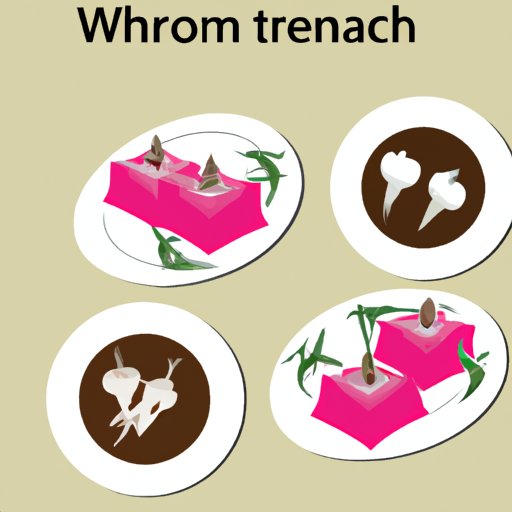Introduction
Wisdom teeth removal is a common procedure that many people go through as they transition into adulthood. The third and final set of molars usually appear in the late teens or early twenties, but for some people, these teeth may never fully develop. When this happens, the wisdom teeth can become impacted, leading to pain and other complications. To prevent further issues, it is often necessary to remove the wisdom teeth.
This article will explore the eating habits that people should follow after wisdom teeth removal. We will discuss the timeline for eating after surgery, the types of foods that should be avoided during the recovery period, and tips for eating comfortably without causing any additional discomfort. By following the advice in this article, you can ensure that your recovery goes smoothly and that your health is not compromised by poor dietary choices.
Eating After Wisdom Teeth Removal: What You Need to Know
After having their wisdom teeth removed, many people are unsure of how to proceed with regards to their eating habits. It is important to take care when eating after wisdom teeth removal, as improper diet can lead to discomfort or even infection. Here are some key points to keep in mind when deciding when and what to eat after wisdom teeth extraction.
Advice on When to Eat After Wisdom Teeth Removal
Immediately after the wisdom teeth have been extracted, it is best to wait at least an hour before eating anything solid. This allows time for the anesthesia to wear off and for the bleeding to stop. During this time, it is recommended to drink plenty of fluids to stay hydrated.
Types of Food to Avoid After Wisdom Teeth Removal
Once the initial recovery period has passed, there are still certain types of food that should be avoided. Hard, crunchy, or chewy foods can irritate the wound and delay healing. These include chips, nuts, popcorn, and hard candy. Additionally, it is important to avoid hot or spicy food, as these can cause pain or discomfort.

A Timeline for Eating After Wisdom Tooth Extraction
The timeline for eating after wisdom tooth extraction varies depending on the individual and the complexity of the procedure. Here is a general guide for when to start eating after wisdom teeth removal.
Immediately After Extraction
It is important to wait at least an hour after the procedure before eating anything solid. During this time, it is best to stick to fluids such as water, juice, and broth.
First 24 Hours
For the first 24 hours after the procedure, it is important to avoid any solid food. Stick to fluids and soft foods such as applesauce, yogurt, and mashed potatoes.
First Week
During the first week after the procedure, it is best to stick to soft foods. This includes scrambled eggs, oatmeal, cottage cheese, and mashed vegetables. Avoid hard or crunchy foods such as chips and nuts.
Long-Term Healing
Once the healing process has started, it is important to continue to avoid hard or crunchy foods. Stick to softer foods such as pasta, rice, and cooked vegetables. Once the wound has completely healed, you can begin to eat normally again.
When Can I Eat Again After Wisdom Tooth Surgery?
It is important to understand the healing process after wisdom tooth extraction before returning to a normal diet. Generally, it takes between 7-10 days for the wound to heal completely. However, this timeline can vary depending on the individual and the complexity of the procedure.
Understanding the Healing Process
The healing process begins immediately after the procedure, though it is important to remember that the wound will be tender and sore for several days. As the wound heals, it will gradually start to feel better and the swelling will decrease.
Factors That Affect Recovery
There are several factors that can affect the recovery process. Smoking, drinking alcohol, and using non-steroidal anti-inflammatory drugs (NSAIDs) can all slow down the healing process. Additionally, if the patient does not take proper care of the wound, it can lead to infection, which can further delay the healing process.
What Foods Should I Avoid After Wisdom Tooth Removal?
In order to ensure the best possible recovery, it is important to avoid certain types of food. Hard, crunchy, and chewy foods should be avoided, as they can irritate the wound and delay healing. Hot or spicy foods should also be avoided, as they can cause pain and discomfort.
Types of Food to Avoid
Foods to avoid include chips, nuts, popcorn, hard candy, and sticky sweets. In addition, it is important to avoid acidic foods such as citrus fruits, tomatoes, and vinegar. Lastly, it is important to avoid foods that require a lot of chewing, such as steak and tough cuts of meat.
Soft Foods to Eat Instead
Instead of hard or crunchy foods, it is best to stick to soft foods that are easy to chew. This includes scrambled eggs, cooked vegetables, oatmeal, mashed potatoes, and yogurt. Additionally, it is important to drink plenty of fluids to stay hydrated.
How Long Does It Take To Heal After Wisdom Tooth Removal?
The healing process after wisdom tooth removal can take anywhere from 7-10 days. However, this timeline can vary depending on the individual and the complexity of the procedure. Here are some factors that can affect the healing time.
Average Healing Time
On average, it takes 7-10 days for the wound to heal completely. However, this timeline can vary depending on the individual and the complexity of the procedure. According to a study published in the Journal of Oral and Maxillofacial Surgery, “healing was considered complete when no signs of infection were present, the socket was dry, and the patient was able to resume normal activity.” 1
Factors That Can Affect Healing Time
There are several factors that can affect the healing time, including age, overall health, and the complexity of the procedure. Additionally, smoking, drinking alcohol, and using NSAIDs can slow down the healing process. Taking proper care of the wound is also important, as infection can further delay the healing process.

Tips For Eating Comfortably After Wisdom Tooth Extraction
Once you have had your wisdom teeth removed, it is important to take care when eating. Here are some tips for eating comfortably after wisdom tooth extraction.
Tips for Eating While Healing
When eating after wisdom tooth extraction, it is important to stick to soft foods that are easy to chew. Additionally, it is important to avoid hard, crunchy, or chewy foods, as well as hot or spicy foods. It is also important to drink plenty of fluids to stay hydrated.
Strategies for Dealing with Pain
If you are still experiencing pain after wisdom tooth extraction, it is important to talk to your doctor. They may recommend over-the-counter pain medication or prescribe a stronger medication. Additionally, it is important to practice good oral hygiene, as this can help reduce pain and inflammation.
Conclusion
Wisdom teeth removal can be a daunting process, but with the right advice and information, it can be a relatively smooth experience. This article has explored the eating habits that people should follow after wisdom teeth removal, including advice on when to eat and types of food to avoid while healing. Additionally, we have discussed the timeline for eating after surgery and tips for eating comfortably after wisdom tooth extraction. By following the advice in this article, you can ensure that your recovery goes smoothly and that your health is not compromised by poor dietary choices.
For more information on wisdom teeth removal, it is important to speak to your dentist or healthcare provider. They can provide advice and guidance on how to best care for your mouth during the recovery period.
(Note: Is this article not meeting your expectations? Do you have knowledge or insights to share? Unlock new opportunities and expand your reach by joining our authors team. Click Registration to join us and share your expertise with our readers.)
